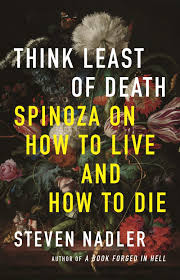Jonathan Rée at Literary Review:
 When he died in 1677 at the age of forty-four, Spinoza left behind a compact Latin manuscript, Ethics, and his disciples quickly got it printed. It is a book like no other. It urges us to change our whole way of thinking and in particular to rid ourselves of the deep-rooted conceit that makes us imagine that our petty, transient lives might have some ultimate significance. The argument is dynamic, disruptive and upsetting, but it is contained within a literary framework of extraordinary austerity, comprising an array of definitions, axioms, propositions, proofs and scholia. The overall effect is not so much beautiful as sublime, like watching a massive fortress being shaken by storms and earthquakes. Many readers have found themselves deeply moved by Ethics but unable to say exactly what it means.
When he died in 1677 at the age of forty-four, Spinoza left behind a compact Latin manuscript, Ethics, and his disciples quickly got it printed. It is a book like no other. It urges us to change our whole way of thinking and in particular to rid ourselves of the deep-rooted conceit that makes us imagine that our petty, transient lives might have some ultimate significance. The argument is dynamic, disruptive and upsetting, but it is contained within a literary framework of extraordinary austerity, comprising an array of definitions, axioms, propositions, proofs and scholia. The overall effect is not so much beautiful as sublime, like watching a massive fortress being shaken by storms and earthquakes. Many readers have found themselves deeply moved by Ethics but unable to say exactly what it means.
more here.
